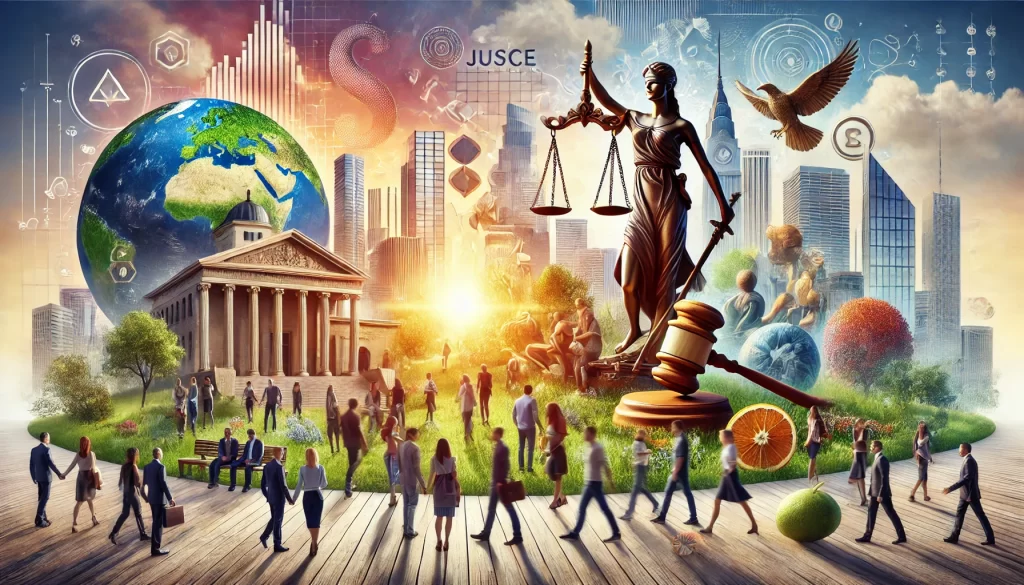A Vision for the Future: The Law of the Land and the System of Feathers as a Path to Global Unity
Introduction: Rising Above Divisions to Achieve Unity
Today, humanity faces a pivotal moment. In an era marked by deep divisions, conflicts, and crises, the need for a unifying system that transcends borders, cultures, and ideologies has never been clearer. Our world suffers from a loss of trust in institutions, rising inequalities, and a disconnection from core values that bind people together. These issues call for a framework capable of uniting us, fostering justice and integrity, and encouraging every individual to contribute to the collective good.
This proposal, The Law of the Land, offers a vision for the future that combines democratic ideals with a profound spiritual understanding. The Law of the Land integrates principles of social justice, respect, and mutual accountability, alongside a unique system of spiritual accountability: The System of Feathers. This unified approach seeks to foster both personal growth and collective harmony, where each person plays a role in building a world of trust, equality, and peace.
1. The Foundation of The Law of the Land: A Philosophy of Justice and Compassion
The Law of the Land rests upon a foundational philosophy: that all individuals deserve to live in a society that respects their rights, nurtures their growth, and treats them with fairness and compassion. In this future society, laws are more than regulations—they embody universal values of kindness, integrity, and responsibility.
At its core, this vision envisions a government that protects its citizens, not through overreach or control, but by creating a framework that enables each person to live freely while respecting the rights of others. This government functions as a guardian of justice, creating laws that prevent greed and protect those who are vulnerable. Within the Law of the Land, the principle of “live and let live” reigns supreme, ensuring that all individuals can pursue their dreams while honoring their social responsibilities.
This society also embraces a global perspective, recognizing that today’s world is interconnected. The Law of the Land calls for universally recognized laws—similar to existing international laws on human rights and environmental protection—but extends further to foster peace and cooperation. The vision includes a redefined democracy where citizens understand their rights and responsibilities, encouraged to actively participate in governance.

2. The Spiritual Journey – Understanding the System of Feathers
Central to this philosophy is the understanding that individuals are spiritual beings on a journey. This is where The System of Feathers comes in—a system that adds depth and accountability to each person’s life by embedding a spiritual guide: the Guardian Angel.
Each person’s soul is assigned a Guardian Angel, who watches over and guides them. Throughout life, every good deed earns a symbolic “feather.” These feathers represent moral achievements and contribute to the soul’s positive growth. The purity of each feather is directly tied to the selflessness of the action—pure, good deeds yield radiant white feathers, while selfish deeds might only yield tattered or discolored feathers. These feathers are collected throughout life, and at the end of one’s earthly journey, the collection of feathers is a testament to how well they have lived according to the principles of the Law of the Land.
If a person knowingly harms others or commits wrongful acts, the feathers can be lost, symbolizing the effect of negative karma. These consequences are not only immediate but also carried forward, as bad karma leads to challenges or hardships until the individual reconciles and seeks to do better. This gentle yet powerful accountability system encourages each person to strive for goodness and service to others, knowing that their actions have lasting effects on both their own soul and the world around them.
3. Education and Civic Duty – Nurturing Citizens of Conscience
A society built on The Law of the Land understands that true unity begins with nurturing thoughtful, compassionate citizens. Education plays a crucial role in this vision, not only by imparting knowledge but by instilling values of empathy, responsibility, and awareness of one’s duties toward society. The goal is to educate young people to recognize their role within a larger community and to inspire them to contribute positively.
This vision also includes a civic duty program, where every citizen, upon reaching adulthood, participates in a year of national service. This service is not merely an obligation; it’s an opportunity for individuals to give back to their communities and gain valuable life experiences. Young professionals in fields such as law, healthcare, and psychology are encouraged to use their skills for the public good. A young doctor might work in underserved communities, while a law graduate could educate high school students about their rights and duties. This hands-on experience helps instill a lifelong sense of pride and commitment to the collective welfare.
By fostering these values early, the society ensures that each citizen is equipped to live according to the Law of the Land, balancing personal freedom with communal responsibility. This holistic approach to education empowers individuals to become active contributors to society, striving for social justice, fairness, and compassion in every action.
4. Transparent Governance through the Traffic Light of Taxation
For a society to function with integrity, governance must be transparent and fair. The Traffic Light of Taxation system is a revolutionary approach that transforms how taxes are collected, ensuring that every citizen and business contributes fairly to the common good. Unlike traditional tax systems prone to evasion, this real-time, transparent tax system creates a visible and trustworthy way to collect resources.
In this system, a small National Homeland Tax (NHT) replaces existing VAT or income tax models, and each transaction is taxed directly at the point of sale. A digital “traffic light” above each register shows when the tax is successfully collected: the red light indicates the transaction’s start, amber signals the tax calculation, and green confirms the tax’s deposit into government accounts. By eliminating the loopholes for tax evasion, this system prevents misuse, ensuring that public funds genuinely benefit society.
The Traffic Light of Taxation also monitors inflation by adjusting tax rates in response to economic needs, making it a dynamic tool for economic stability. With this system, citizens are more willing to pay taxes, knowing their contributions directly support education, healthcare, and essential public services. This transparency builds trust between the government and the public, reinforcing the idea that the government truly serves the people.

5. A New Perspective on Peace and Unity
At the heart of The Law of the Land is a profound commitment to peace and unity. Rather than focusing on divisive labels such as nationality, race, or religion, this philosophy emphasizes shared humanity and the belief that we are all connected through our actions, our energies, and our spirits. By fostering a sense of mutual respect and empathy, the Law of the Land offers a path to reduce conflict and build understanding.
The prophetic vision that “the wolf shall dwell with the lamb” and “nation shall not lift up sword against nation” reflects the aspirations of this philosophy: a world where compassion transcends fear, and justice replaces rivalry. Such peace is achievable only through individual transformation—each person striving to live in harmony with themselves, with others, and with the natural world. This philosophy urges people to see beyond their differences and to focus on the shared values that can unite us all.
6. Achieving Harmony between Individual Freedom and Social Responsibility
A balanced society is one where individual freedom is celebrated but always with an awareness of one’s responsibility toward others. Under The Law of the Land, this balance is preserved by encouraging each person to recognize that their actions affect others. The principles of karma and accountability within the System of Feathers emphasize that every action has consequences.
In this society, empathy becomes a natural part of life. People are encouraged to “see the soul” in each other, recognizing that we are all part of a shared journey. The ego is acknowledged but gently directed toward goodness, kindness, and service, understanding that a life of selflessness yields the richest rewards. With this understanding, each person is inspired to act with compassion, knowing that their good deeds accumulate not only for their own benefit but also for the enrichment of society as a whole.
Conclusion: A Future of Compassion and Unity
The vision of The Law of the Land and The System of Feathers offers a compelling blueprint for the future—a world where laws are grounded in empathy, where governance is transparent and fair, and where every person’s spiritual journey is respected and nurtured. This philosophy is a call to all individuals, inviting them to embrace a new way of life rooted in justice, compassion, and collective responsibility.
Imagine a world where each soul acts not just for itself, but for the well-being of all. A world where governments serve as protectors and guides, where young people are taught to value empathy and integrity, and where every person’s spiritual growth is recognized as essential to the progress of society. This is the promise of The Law of the Land.
Together, we can create a world that respects the dignity of every individual and honors the interconnectedness of all life. This future is within reach, a vision that calls us to live with purpose, with kindness, and with a commitment to a shared destiny. Let us walk this path together, each step a testament to our dedication to peace, unity, and the betterment of humanity.



Comments are closed